By Mark McGee
Waylon Jennings and Willie Nelson sang the warning, “Mamas don’t let your babies grow up to be cowboys”.
Rhea Ellen Webb didn’t really have a fighting chance in trying to prevent sons Lane and Cy from pursuing the life of the cowboy through rodeo competitions.
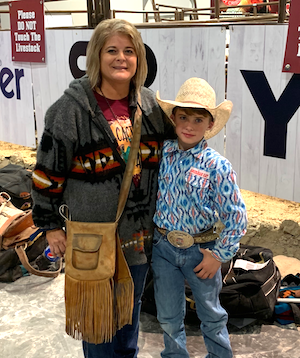
Raised on Tennessee Walking Horses, the dust and mud of rodeo competition won over both youngsters. Their father, Link, is a walking horse trainer. Rhea Ellen has won her share of world grand championships and world championships on Tennessee Walking Horses.
But, Lane was bitten by the cowboy bug while watching movies starring the likes of John Wayne and Gene Autry. He was given a rope at the age of four and was quickly tagged a natural. He started out on the ground lassoing dummies before working himself up to roping calves on horseback.
“He roped everything around,” Rhea Ellen said. “All Lane watched was Westerns growing up. He has always wanted to be a cowboy. It has just grown from there.”
Rhea Ellen played basketball at Tennessee Tech University. She compares roping with shooting a basketball.
“For some people shooting a basketball comes natural to them and for some people it doesn’t,” Rhea Ellen said. “Roping came natural to Lane. It also came natural to Cy too.”
Rhea Ellen thought since she was a good shooter with a basketball, she could rope as well. She was wrong.
“I haven’t practiced much, but it is not a natural feeling for me,” Rhea Ellen said.
Younger brother Cy followed in Lane’s footsteps. Both he and Lane are champions in tie-down roping. But, Cy prefers the thrills and challenges of riding bulls and bucking horses having cut his teeth on saddle bronc riding, including winning the all-around title in 2018. Like his brother, who demonstrated natural abilities early in roping, Cy quickly showed he was a natural in bronco busting.
Ironically, the song, a cautionary tale, was written by Ed and Patsy Bruce. Ed was a well-known owner of Tennessee Walking Horses.
Despite the song’s lyrics, Lane appears to be destined to pursue the cowboy life. A senior at Pickett County High School, Lane wants to major in agri-business in college. He is most interested in schools which offer rodeo scholarships, and several schools are interested in him.
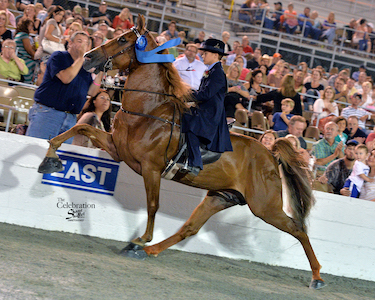
Despite winning three world championships at The Celebration, Lane prefers the cowboy life.
In Tennessee High School Rodeo Association competition this year, Lane was named reserve “best all-around cowboy”, and earned championship first place honors in calf roping and team roping with Bryson Tays. He was named to the team from Tennessee for the Nationals.
“There are high school rodeos every month,” Rhea Ellen said. “You have to be in the top four to qualify for the nationals. It is a huge deal.”
Road warriors
The time Rhea Ellen spends on the road with a large horse trailer that doubles as their home on the road would put the most ambitious soccer mom to shame. Rhea Ellen conservatively estimates she drives 10,000 miles a year.
Las Vegas, the home for the Junior World Finals, is roughly 2,000 miles each way from their home in Byrdstown, Tennessee. It is a three-day drive to allow stops for the three to four horses they haul to get some exercise. Rhea Ellen manages to teach math and geometry full time at Pickett County High School despite being the ultimate weekend road warrior.
“Gosh, we travel a lot of miles,” Rhea Ellen said. “We not only go to Las Vegas hauling horses, but we go to Wyoming, Oklahoma and Texas four or five times a year.
“We travel around a lot in Texas to go to qualifying rodeos. Then we go all over the Southeast for high school rodeos and Lone Star Rodeos.”
It can be a grueling schedule, but Lane now shares the driving chores. This year in June they spent two weeks in Texas and one week in Shawnee, Oklahoma.
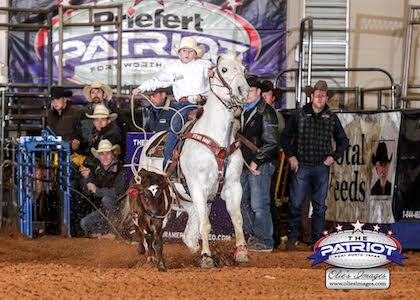
Rhea Ellen shared the following story with Jack Nowlin on the Junior World Finals blog in 2019 about a Las Vegas trip.
“I was trying to make Amarillo, Texas, by about midnight so we could get to a barn and turn the horses out,” Rhea Ellen told Nowlin. “But an hour outside of Amarillo I was getting tired, so I stopped at a truck stop, put the truck in neutral and was going to rest my eyes. I woke up four-and-a-half hours later and the truck was still in neutral.”
Las Vegas is a trip they have made four times for the junior competition in the National Finals Rodeo.
“Last year it was postponed because of COVID-19, but two years ago Cy won his age division in the bucking ponies,” Rhea Ellen said. “For his age he was Junior NFR World Champion.
“This past year the Vegas show went to Fort Worth, Texas. Lane finished second in the world in July in calf roping, losing by nine-hundredths of a second. He was live on the Cowboy Channel.”
Rhea Ellen seldom finds time to watch a walking horse show anymore. She enjoys watching Lane and Cy compete more than she does being back in the walking horse world.
“This is for them,” Rhea Ellen said. “Lane trains and sells rodeo horses. And the more he and Cy practice the better they do.”
A natural
Lane’s rodeo path started with lessons from Tom Bourne at his Bourne Arena at his house in Spring Hill, Tennessee. Bourne hosts team roping events, gives lessons and buys and sales roping and barrel racing horses. Bourne’s facility has moved to Culleoka where rodeos are held on a regular basis.
“I met the Webb family through my wife, Shawna, who taught school with Rhea Ellen in Chapel Hill,” Bourne said. “I got a phone call one day there was a little boy from Chapel Hill who wanted to learn to team rope.
“So, Rhea Ellen brought him out to the house. That kid was just full of want to and desire. You could see it in him. He had a little bitty horse, and he was a little bitty kid.”
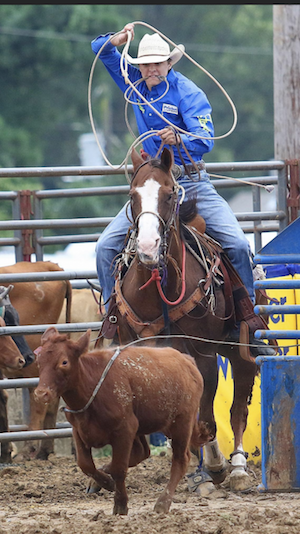
Bourne showed Lane the basics of roping but he backs away from taking any credit for what Lane has done and will do in rodeo competitions. In his eyes, Lane has always been naturally gifted.
“Lane is self-made,” Bourne said. “Both he and Cy have put the work in.
“Lane was always really passionate. That is what it takes in the sport of rodeo. If you want to excel, it takes blood, sweat and tears and that is exactly what Lane has done.”
On Tuesday night’s Lane would spend time working at Bourne’s facility, practicing roping dummies and watching the techniques of other ropers.
“I learned from each one of them,” Lane said. “They all have little tricks you might be able to use.”
Bourne points to Lane’s background riding Tennessee Walking Horses at an early age for helping him develop so quickly in roping.
“His Dad was always putting him on different horses and that really helped with his horsemanship,” Bourne said. “The more horses you ride, the better horseman you become.”
Lane, 17, and Cy, 12, are driven by a love for what they do.
“Rodeo is one of those sports that you get out of it what you put into it,” Bourne said. “If you work hard at it, you will see results. Lane and Cy learned that really quick. And if you love something it isn’t like it is hard work.”
Roping skills
Success in tie-down roping, team roping and breakaway roping boils down to good horsemanship and sprinting ability as much as being quick and accurate with a rope, according to Professional Rodeo Cowboy Association (PRCA) Sports News. The article adds “tie-down roping success depends on the precise teamwork between the cowboy and his horse.
“It is important to have good hand-eye coordination,” Lane said. “You have to be able to sit in the saddle and throw a rope.
“You have to have good vision of the ring. You need to know where the calf is at all times.”
In addition to awareness of where the calf might be, anticipation of what the calf might do is also a necessary skill.
“Sometimes you watch a calf get roped by someone else and you draw the same one,” Lane said. “You can see what that person did in trying to rope the calf.”
Each day after school Lane and Cy practice. They have stall space at their uncle Scott Beaty’s walking horse training barn. They travel to a friend’s house where they practice roping.
Tough enough
It takes guts to get on the back of any animal that doesn’t want you to be there, but Cy is not deterred. He takes a nonchalant approach to his competing in the Miniature Bull Riding and the Mini Bareback Divisions, something he has done since he was eight years old.
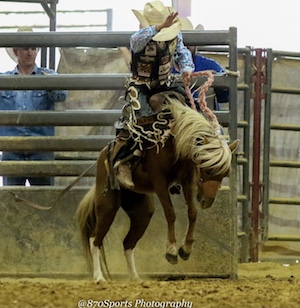
“I just go up and do it,” Cy said. “Every time it is different. It is best not to think about it.”
Rhea Ellen doesn’t take it quite as nonchalantly.
“It is miniature bulls and bucking ponies of different sizes, but Cy is still able to get hurt every time,” Rhea Ellen said. “He is little. He was made to ride bulls. They say if you are scared when you get on is when you will get hurt and he is not scared.
“So far it is all right with me. I’ve always said if I had been a boy, I probably would have tried to ride bulls too.”
Rhea Ellen is more concerned about Cy in the future.
“I would rather he stick to roping as he gets older,” Rhea Ellen said. “In the bigger rings I am afraid he is going to stay hurt a lot.”
Cy also plays basketball at Pickett County Junior High even though he is only a sixth grader. That kind of toughness and drive is what impressed Bourne when he worked with Cy.
“When you identify that one tough customer that is Cy,” Bourne said. “They don’t come any tougher than little Cy.
“He can rope too, but he definitely loves that rough stuff. It is not too hard for him.”
Cy has always looked up to his big brother. Lane is helping Cy be the best he can be as well, especially in team and tie-down roping. Cy has competed in Breakaway and Steer Stopping roping events. He and Lane also break ponies as well.
“Lane has been training and riding for other people,” Rhea Ellen said. “He actually started and trained a horse Cy is roping on right now and he did a great job. There’s no way I could buy her for what she’s worth right now.”
Horsemanship is just as important to tie-down roping as being able to be quick and accurate in roping a calf. Lane stresses that temperament is what makes or breaks a roping horse.
“You want a horse that doesn’t let the noise in the arena or the music or anything else bother him,” Lane said.“You also want a horse that moves well whether we are going forward or backward. That is very important.”
Four years ago, Lane purchased Pepe, a dark sorrel, and they have clicked as a team.
“When you come across a good horse it is like a miracle,” Lane said. “I had seen others ride him before I bought him. I liked what I saw.”
Making the sacrifice
Lane and Cy work hard training for rodeo competitions, but they couldn’t do it without the support of Rhea Ellen and Link.
“Their parents have done what parents are supposed to do, in my opinion, by giving them the opportunity and making sure they have what it takes to keep moving up and be successful at it,” Bourne said. “And that means buying horses, rigs, trucks, trailers, bridles, saddles and the ropes.
“There is so much that goes into it that their parents have supplied them with. Lane and Cy have supplied the hard work.”
Rhea Ellen credits Bourne for giving Lane and Cy their starts, but through the years she and her boys have received help from a number of people.
“At these little junior rodeos, I went for a whole year bringing the wrong ropes every time we went,” Rhea Ellen said. “I finally walked in there and told them, `listen, we train walking horses and we don’t know anything about this’. We learned a lot as we went on.
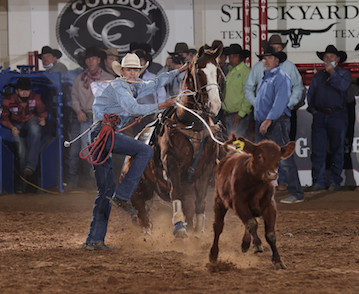
“There are a lot of people who have helped us. It is a good industry with people who are willing to help kids.”
Lane’s experience has helped Cy to advance rapidly. Cy has been the beneficiary of “hand-me-down” horses from Lane.
Bourne has no doubts Lane is going to continue to be a top rodeo cowboy, no matter what the level.
“It has been a real cool journey for me to watch Lane go through,” Bourne said. “A lot of people think that champion cowboys only come from out West from places like Wyoming, Oklahoma and Texas, but that is far from the truth.
“If you look at the Pro Rodeo Cowboy Association’s world standings, which is like the Super Bowl of Rodeo, in the team roping event there are cowboys from Georgia and Florida at the top.”
Bourne made the national finals when we was 26 years old. He expects Lane to compete at that level as well.
“I have competed at the highest levels you can compete at different points in my life,” Bourne said. “Lane will be there. That kid will go as far as he wants to go. I see him being a World Champion someday.”